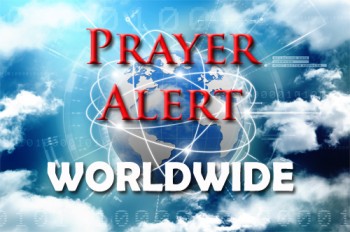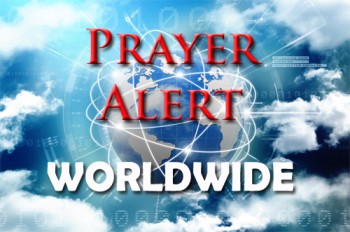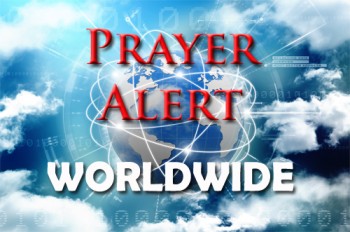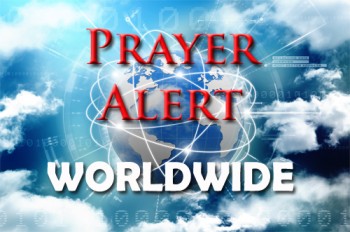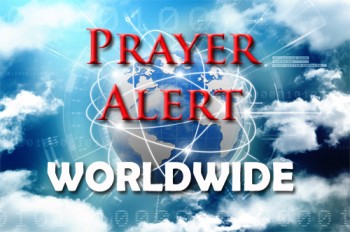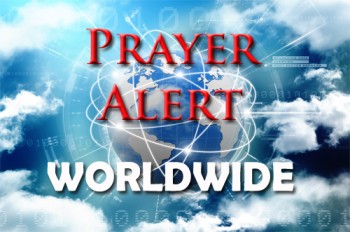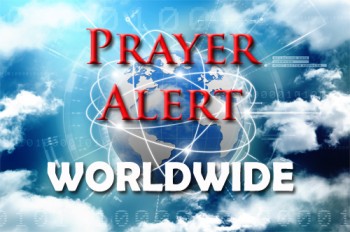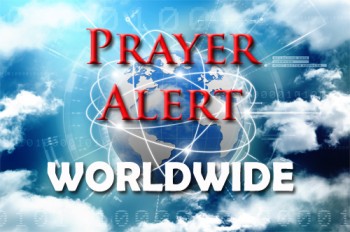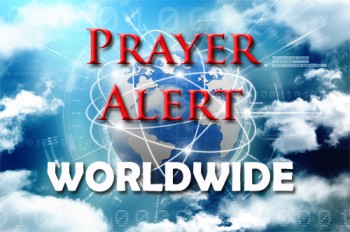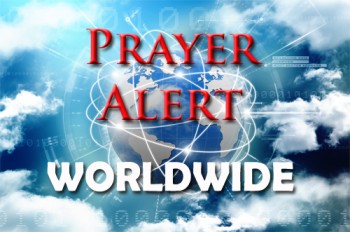Displaying items by tag: Asia
Philippines: three earthquakes, two typhoons
Of the 12 disaster-prone cities in the world, ten are in the Philippines. It is not a matter of ‘if,’ but ‘when’ that typhoon or earthquake will come, as happened recently. The devastation and the intensity of these are what are so unique. Hundreds have died and over 1,000 are displaced and lost. Then came Tropical Storm Nakri, which developed into a typhoon. The epicentre of the deadly quakes was near Mindanao, where World Mission minister. There is a great humanitarian effort going on right now, with local churches responding with food, shelter, and clothing - all in the love of Jesus. Previously there had been hostility to the Gospel in this region, with some areas hosting IS training camps. However when these disasters strike,it definitely creates a wide-open door for the Gospel, as the churches’ help is well-received. The Philippines get about two thousand earthquakes a year.
Hong Kong: US act and election results
The US Senate has passed a Hong Kong Human Rights and Democracy Act (see ) that aims to protect the human rights and autonomy and freedoms of Hong Kong. This bill sends a message of hope to many pro-democracy protesters. China warned it could take ‘firm counter-measures’ if Washington continues to show support for Hong Kong’s pro-democracy protesters. We need to pray that more nations in the free world will also send a clear message to Beijing that they stand with Hong Kong in their struggle for democracy. Meanwhile, Hong Kong’s first election since the protests began saw a turnout of 71% as people stood up to defend their freedoms against an increasingly aggressive Beijing. Their votes resulted in seventeen of the eighteen district councils now being controlled by pro-democracy councillors. However, China’s state media outlets are either making no reference at all to election results or claiming ‘tampering’ had taken place.
China: UK calls for immediate UN access to Xinjiang
The Foreign Office has called on China to allow UN observers ‘immediate and unfettered’ access to China’s Xinjiang Uyghur autonomous region, after two leaks provided further evidence of mass arbitrary detentions. An estimated 1 to 3 million Muslim Uyghurs and other ethnic minorities are detained without charge in ‘political re-education’ camps. US media published 400+ pages of documents detailing widespread involvement of senior Chinese officials in these unprecedented mass detentions, where authorities use a scoring system to determine who can leave the camps. Also, the behaviour of relatives outside the camps can affect detainees’ chances of release. More documents were leaked by investigative journalists, similarly detailing mechanisms, guidelines and procedures behind the detentions in Xinjiang and the severity of conditions inside the camps. China claims that the camps are voluntary training centres to combat terrorism.
Iranians urged to expose regime abuses
US secretary of state Mike Pompeo has urged Iranians to continue sending messages exposing the Iranian regime’s brutal crackdown on recent widespread protests; by some estimates, over 200 people have been killed. He stated the USA would impose sanctions on those it could identify for perpetrating abuses. ‘The Iranian people are, once again, on the streets because of the regime’s poor economic management,’ he said. ‘Instead of addressing their grievances, Tehran has responded with violence and by blaming those outside the country.’ Despite the Iranian regime's shutdown of the internet last week, the United States received 20,000 messages, videos and pictures from Iranians through a messaging service. ‘The United States hears you,’ Pompeo said. ‘We will continue to sanction Iranian officials who are responsible for these human rights abuses, just like we did to Iran’s minister of communications.’
Antibiotic Awareness Week
‘I only spent one week in Mosul, but I’ll never forget what I saw. The scars of war there are not just destroyed buildings, closed hospitals, and empty streets; they are also adults and children in severe pain, injured first by war and then infected by bacteria that defy treatment by most available antibiotics. People wonder if they will ever walk, play football with their friends, or even lift a cup of tea again. I’ve been working as an epidemiologist with Médecins Sans Frontières for eight years, focussing on measles, malaria, cholera, malnutrition, and other major health crises. I witnessed children, severely underweight, needing immediate treatment to survive. We understand how to treat life-threatening situations, but now antibiotic-resistant infections are in Gaza, Aden, and Mosul. They are incredibly complex to manage and difficult to explain, and can take a huge psychological toll on patients. This is World Antibiotic Awareness Week, but one week is not enough.’
Hong Kong: threat to religious freedom
A Christian activist says the religious freedoms of Hong Kong citizens could be at risk if the government continues to ignore the demands of protesters. The violence is some of the worst seen in the territory since anti-government demonstrations began almost six months ago. Co-founder and chair of human rights charity Hong Kong Watch, Ben Rogers, says, ‘It's worth remembering that the violence really was started by the police. If general freedoms are further eroded, sooner or later religious freedom will be affected. If Hong Kong's way of life is dismantled, then the church will be directly affected, and so pray specifically for the Hong Kong church at this time.’ May the global Church hear Rogers’ concern for the potential implications this conflict could have on religious rights in Hong Kong, and pray accordingly.
Pakistan: Christian’s murder is covered up
The family of 18-year-old Akash, a Christian working at a bakery, claim their son was murdered by Muslim co-workers. ‘My son was an expert at baking and his expertise was liked by the customers, but he faced religious discrimination and jealousy at work’, says Sarwar, Akash’s father. On 24 September, the bakery informed Sarwar that his son was not well and had been taken to hospital. When he arrived there, his son was already dead. He attempted to investigate, but the bakery said, ‘We will teach you a lesson if you go for legal course against us.’ The police claim that Akash committed suicide. A video of his body was released on Facebook, showing signs of torture on his back and neck. The video has gone viral. Sarwar’s application to exhume Akash’s body for investigation has been denied by the court - delaying tactics to nullify evidence.
Vietnam: Christian teacher and alleged Facebook posts
Last year Vietnam passed a cybersecurity law requiring social media sites to remove any content requested by the government. Of the 128 political prisoners in jail, approximately 10% were jailed over alleged Facebook posts. Nguyen Nang Tinh, a 43-year-old Christian music teacher, has been sentenced to eleven years in prison on charges of propaganda against the state in Facebook posts. On 17 September, police officially closed the investigation and set a court date. On 17 November he was sentenced by the courts, a month later than originally scheduled. He was charged with ‘fabricated, preserved and disseminated information, materials and objects with the aim of opposing the Socialist Republic of Vietnam’. The posts in question were made under a Facebook account with the same name, though Tinh has repeatedly claimed that it is not his.
Iraq: protests and scandals
Anti-government protests over corruption and lack of jobs and public services have continued since early October. On 21 November, force by security guards failed to unblock Baghdad bridges and al-Tahrir Square where hundreds of protesters held their ground against bullets and teargas. They also have blocked roads around Basra. Road closures lead to large losses for the Iraqi economy and negatively affect the daily life of citizens by preventing the flow of food, medical supplies and other goods. Demonstrators demand comprehensive political reform, accountability for corruption, improvement of public services, and job opportunities. But protests are not reshaping the country's politics. They are affecting the entire region as new scandals against the government are revealed almost daily. The most recent exposed Tehran's growing influence in Iraq.
Israel: EU condemns rocket fire on Israeli civilians
On 12 November the Israel Defence Forces killed a senior commander of a Jihad terror group responsible for firing dozens of rockets out of the Gaza Strip. This prompted a massive retaliation of over seventy rockets fired at Israel’s civilian districts. The UK’s foreign office advised visitors that attacks could be indiscriminate, including places frequented by foreigners, and on public transport. Most embassies in Tel Aviv have heightened caution or have temporarily closed. Palestinian Islamic Jihad declared that it was preparing for war with Israel. By 13 November, 220 rockets had been fired as far north as Tel Aviv, with 90% intercepted by the army. Schools in the south and much of the centre were closed, keeping 1 million students at home, and a commando unit was deployed to secure border communities from possible infiltration. On 14 November a ceasefire was achieved, but just hours later five rockets were launched from the coastal enclave, with two of them intercepted by Israel’s army. See also
